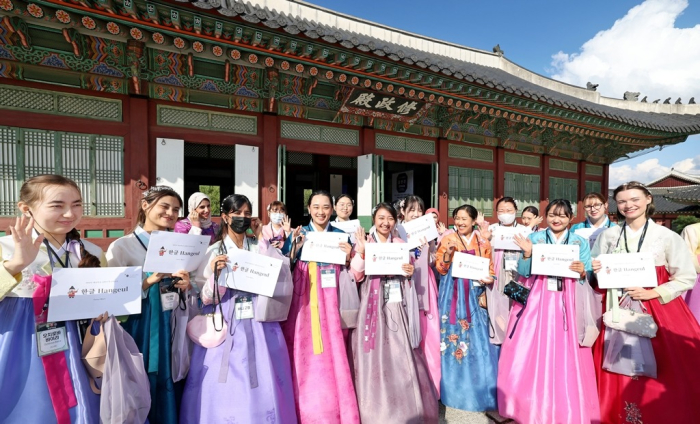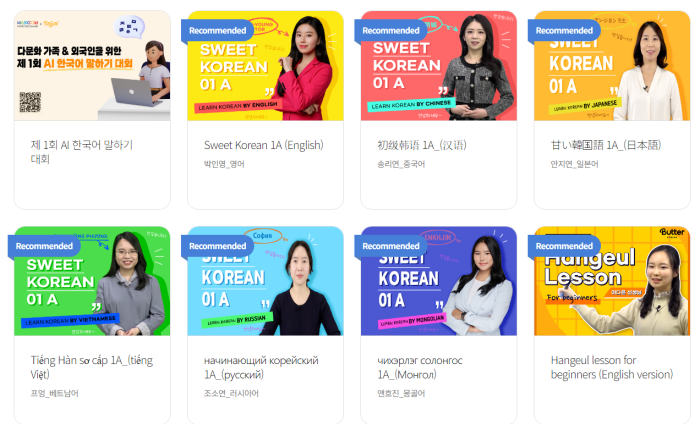Korean startups
Korean language demand creates new overseas markets for startups
Generative AI applications help systems understand inaccurate pronunciation, sentence structures, providing unlimited answers
By Sep 29, 2023 (Gmt+09:00)
5
Min read
Most Read
LG Chem to sell water filter business to Glenwood PE for $692 million


KT&G eyes overseas M&A after rejecting activist fund's offer


Mirae Asset to be named Korea Post’s core real estate fund operator


StockX in merger talks with Naver’s online reseller Kream


Meritz backs half of ex-manager’s $210 mn hedge fund



South Korean language startups are expanding their business in overseas markets with their local tongue through generative artificial intelligence, taking advantage of increasing global demand to learn Korean, as the country’s cultural products such as drama series and K-pop continue to attract fans across the world.
Those startups applied generative AI to Korean education programs for foreigners as the industry saw profitable business opportunities from the language study sector. Generative AI applications based on large language models (LLMs) help their systems understand the inaccurate pronunciation of speakers and sentence structures, producing an endless suppy of learning materials.
The move came as South Korean language startups suffered cut-throat competition in the English learning service market based on AI.
“The AI-based English study service providers in the country faced weaker profitability with some of them cutting jobs since last year,” said an industry source in Seoul. “Startups, which make inroads into foreign countries earlier than others, will enjoy more growth potential as demand for Korean language study is growing in overseas markets such as the US and Southeast Asia.”
Those startups said the Korean language learning market for foreigners is much larger than the English study sector in South Korea, although both services need the same technology.
The number of students who study Korean in US higher education institutions such as universities has risen 25.4% since 2016 until last year, according to the Modern Language Association of America.
TO REVAMP BEST-SELLING KLEAR TEXTBOOKS FOR FOREIGNERS WITH AI
Wrtn Technologies Inc., a South Korean AI startup, recently agreed with the University of Hawaii Press to cooperate on the introduction of an AI-based Korean language curriculum, according to industry sources in Seoul.
The two parties plan to completely revamp KLEAR Textbooks in the Korean language, developed by the Korean Language Education and Research Center (KLEAR) with the support of the Korea Foundation. They aim to connect AI education programs with QR codes and open a four-credit regular course at the university. The project is led by Kang Soo-jin, who holds a doctorate in linguistics, whom Wrtn hired as a prompt engineer in May. A prompt engineer is responsible for optimizing the performance of the AI tool’s performance.
The KLEAR Textbooks in Korean Language series, which was first published in 1994, are best-selling learning materials highly respected by Korean-language instructors and students worldwide. The series is currently used at 180 US colleges including Harvard University and Stanford University.
The University of Hawaii founded the Center for Korean Studies in 1972, the oldest and largest research institute outside the country, as the college has been actively studying the origins of Asian immigrants on the islands.
Wrtn and the university plan to add a speaking script feature generated by AI, which allows users to write their own sentences they want to memorize, into KLEAR Textbooks.
They also aim to add features such as introducing controversial topics such as the conflict between the two Koreas as well as correcting grammatical errors in students’ work on behalf of teachers and presenting an accurate pronunciation of sentences. The AI will also try to explain Korean proverbs in context.
GENERATIVE AI
Hancom GenieK Corp., a joint venture established in July between South Korea’s homegrown office suite developer Hancom Inc. and an online Korean tutoring startup Sarlang, is focusing on generative AI-based Korean speaking education.
Generative AI produces an unlimited number of answers and removes boundaries as it does not answer only what it has learned. Other technology such as voice recognition, which AI can learn with small sizes of data, has also been advancing.
“Generative AI technology allows us to avoid a speaking class based on scenarios,” said Hancom GenieK CEO Lee Kwang-heon. “We can answer questions, which are not in scenarios, while evaluating learners more than just checking if their voices match the existing data.”

The JV’s top priority are Anglo-American countries such as the US in consideration of making inroads into China and the Latin American market.
Edtech company Visang Education Inc. and software developer Ieetu Co. are preparing a similar service.
The two companies are developing a hyperscale AI conversation system for Korean study by foreigners with an aim to launch a customized education service offered by AI, which understands the different pronunciations of learners by nationality and answers users’ questions to match their skills.
The system, a part of a program supported by the state-run Institute of Information & Communications Technology Planning & Evaluation, will be used for Vietnam’s public education in March 2024.
SILICON VALLEY MASTER JOINS THE MOVE
Mirinae Technologies Inc., a Seoul-based startup established by John Wainwright, a first-generation Silicon Valley computer scientist, and Ray Yoo, a South Korean veteran software engineer, developed a sentence analyzer that combines a Korean compiler and generative AI.
A compiler is special software that translates a programming language's source code into machine code, bytecode or another programming language.
Mirinae’s AI-based Korean compiler analyzes sentences by morphemes while understanding the composition of new words or proverbs.
“We have about 60,000 monthly active users now,” Mirinae CEO Yoo said. “We are providing the service in various languages such as English, Japanese, Vietnamese and Russian with a plan to launch the service in Arabic soon.”
Write to See-Eun Lee at see@hankyung.com
Jongwoo Cheon edited this article.
More to Read
-
 E-commerceLuxury fashion platform Balaan files for court receivership amid slump
E-commerceLuxury fashion platform Balaan files for court receivership amid slumpMar 31, 2025 (Gmt+09:00)
-
 E-commerceKorea’s beauty wholesaler to invest $10 mn in fashion platform Balaan
E-commerceKorea’s beauty wholesaler to invest $10 mn in fashion platform BalaanMar 04, 2025 (Gmt+09:00)
-
 Korean startupsHyundai Motor spins off 4 in-house startups in energy, AI, mobility
Korean startupsHyundai Motor spins off 4 in-house startups in energy, AI, mobilityMar 04, 2025 (Gmt+09:00)
-
 Korean startupsSouth Korea loses tech startups at rapid clip amid dwindling funding
Korean startupsSouth Korea loses tech startups at rapid clip amid dwindling fundingMar 03, 2025 (Gmt+09:00)
-
 Korean startupsFunding to Korean tech startups at 7-year low; seed funding soars
Korean startupsFunding to Korean tech startups at 7-year low; seed funding soarsFeb 03, 2025 (Gmt+09:00)
Comment 0
LOG IN


